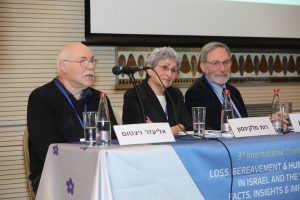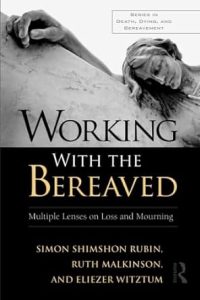
Shalom and Welcome
October 9, 2024 – The Rosh Hashana and Yom Kippur High Holidays

Dr. Ruth Malkinson – Director of Training
Professor Eliezer Witztum
Hello and Shalom,
This site functions as a bridge to link people. We seek to link those who are looking for answers to various questions and the International Laboratory for the Study of Loss, Bereavement and Human Resilience. We understand that many questions can lead you to our site. Some of you are dealing with the loss of a loved one and seek guidance, information or assistance. Some of you are professionals and policy makers who look to this site as a source for up to date and reliable information. And many others may find themselves here due to any number of reasons. All of us are interconnected members of families, communities, and society where loss can come swiftly to change the lives of .people we are connected to.
We understand that loss is a major topic and that simple answers can not begin to do justice to the meanings and impact of bereavement in our lives. The questions people have vary and change for many reasons.The process of adapting to loss takes time, and understanding the multiple pathways that people take to respond to loss often takes time as well. The days, months, and years that follow bereavement reflect different realities for different people. There is no one right way or one reality for loss.
Our main goal in general, and for this website in particular, is to be of assistance to persons around the topic of bereavement, loss and resilience following loss. Resilience means some and all of the following: 1) the ability to overcome difficulty and live again after serious difficulty and tragedy; 2) that human quality of dignity that all of us share; and 3) those qualities that help us grieve and mourn the loss of those we love in ways that are adaptive.
The site is currently under construction and is undergoing revision. We hope that even in its present form, it can assist you in at least some of your search. My colleagues and I hope you will help us improve by providing feedback and suggestions There are also participatory activities which include conferences, seminars, involvement in research (with feedback to participants), and training for professionals.
For those of you who are in the midst of grief, we send our condolences. Grief and mourning are human experiences from the beginning of time for all of humankind. But the pain of grief and the mourning for a particular person who has died are always highly individual and meaningful in unique ways. May you find your way to remember your loved one and maintain your connection to life in ways that are right for you.
Sincerely,
Simon Shimshon Rubin
Director
Announcements and Current Information – February 14, 2024
On February 9, 2024, Professor Robert Neimeyer and Dr. Carolyn Ng gave a lecture titled “Grief Therapy for Traumatic Loss: Integrating the Narrative of the Death.” The lecture is featured on the youtube channel of the laboratory. Supplemental materials: Slides & Handout
YouTube Channels – Current
2012 Volume with Much Relevant Information
Website of Professor Simon Shimshon Rubin with many additional materials including full list of publications.
RESEARCH
The Two-Track Bereavement Questionnaire3 – CG11 – This 11 item self-report measures was developed as a screening tool and baseline assessment measure. It is undergoing validation.
We are currently updating our research capabilities to take into account the events that began on October 7, 2023.
SURVEY
RESEARCH
If you write to us at lbhrl2023@gmail.com, we will try to contact you when circumstances permit this.
Thank you,
Staff of the International Laboratory for the Study of loss, Bereavement and Human Resilience
Article of the Month:
Rubin, S.S., Manevich, A., & Yehene, E. (2024). Continuing Bonds in Marriage, Death and Divorce: Conceptual and Clinical Considerations in the Relationship to Self and Spouse. Omega. DOI: 10.1177/00302228241226471
Manevich A, Yehene E and Rubin SS (2023) A case for inclusion of disordered Non-Death Interpersonal Grief as an official diagnosis: rationale, challenges and opportunities. Frontiers in Psychiatry 14:1300565. doi: 10.3389/fpsyt.2023.1300565
Rubin, S.S., Malkinson, R . & Witztum, E. (2020) Traumatic Bereavements: Rebalancing the Relationship to the Deceased and the Death Story Using the Two-Track Model of Bereavement Frontiers in Psychiatry DOI: 10.3389/fpsyt.2020.537596


